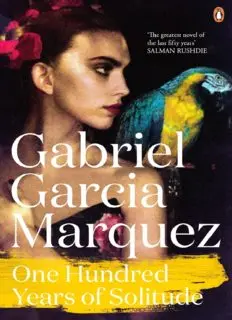
One Hundred Years of Solitude PDF
Preview One Hundred Years of Solitude
Gabriel García Márquez ONE HUNDRED YEARS OF SOLITUDE Translated from the Spanish by Gregory Rabassa Contents One Hundred Years of Solitude ABOUT THE AUTHOR Gabriel García Márquez was born in Aracataca, Colombia, in 1927. He studied at the University of Bogotá and later worked as a reporter for the Colombian newspaper El Espectador and as a foreign correspondent in Rome, Paris, Barcelona, Caracas and New York. He is the author of several novels and collections of stories, including Eyes of a Blue Dog (1947), Leaf Storm (1955), No One Writes to the Colonel (1958), In Evil Hour (1962), Big Mama’s Funeral (1962), One Hundred Years of Solitude (1967), Innocent Eréndira and Other Stories (1972), The Autumn of the Patriarch (1975), Chronicle of a Death Foretold (1981), Love in the Time of Cholera (1985), The General in His Labyrinth (1989), Strange Pilgrims (1992), Of Love and Other Demons (1994) and Memories of My Melancholy Whores (2005). Many of his books are published by Penguin. Gabriel García Márquez was awarded the Nobel Prize for Literature in 1982. He lives in Mexico City. for jomí garcía ascot and maría luisa elío PENGUIN BOOKS ONE HUNDRED YEARS OF SOLITUDE ‘The greatest novel in any language of the last 50 years’ Salman Rushdie ‘The most important writer of fiction in any language’ Bill Clinton ‘Should be required reading for the entire human race’ New York Times ‘No lover of fiction can fail to respond to the grace of Márquez’s writing’ Sunday Telegraph ‘It’s so much fun to read, unexpected and beautiful’ Darryl Hannah ‘The book that sort of saved my life’ Emma Thompson ‘It’s the most magical book I have ever read. I think Márquez has influenced the world’ Carolina Herrera ‘A masterpiece and one of the undeniable classics of the century’ The Times Educational Supplement ‘A tour de force. Enchanting’ The Times Literary Supplement ‘Enormously, kaleidoscopically, mysteriously alive’ Guardian ‘Fantastic, amiable and ironic. Splendid’ New Statesman ‘Dazzling’ New York Times ‘Every word and incident counts, everything hangs together, the work is a neatly perfect organism’ Financial Times MANY YEARS LATER, as he faced the firing squad, Colonel Aureliano Buendía was to remember that distant afternoon when his father took him to discover ice. At that time Macondo was a village of twenty adobe houses, built on the bank of a river of clear water that ran along a bed of polished stones, which were white and enormous, like prehistoric eggs. The world was so recent that many things lacked names, and in order to indicate them it was necessary to point. Every year during the month of March a family of ragged gypsies would set up their tents near the village, and with a great uproar of pipes and kettledrums they would display new inventions. First they brought the magnet. A heavy gypsy with an untamed beard and sparrow hands, who introduced himself as Melquíades, put on a bold public demonstration of what he himself called the eighth wonder of the learned alchemists of Macedonia. He went from house to house dragging two metal ingots and everybody was amazed to see pots, pans, tongs, and braziers tumble down from their places and beams creak from the desperation of nails and screws trying to emerge, and even objects that had been lost for a long time appeared from where they had been searched for most and went dragging along in turbulent confusion behind Melquíades’ magical irons. “Things have a life of their own,” the gypsy proclaimed with a harsh accent. “It’s simply a matter of waking up their souls.” José Arcadio Buendía, whose unbridled imagination always went beyond the genius of nature and even beyond miracles and magic, thought that it would be possible to make use of that useless invention to extract gold from the bowels of the earth. Melquíades, who was an honest man, warned him: “It won’t work for that.” But José Arcadio Buendía at that time did not believe in the honesty of gypsies, so he traded his mule and a pair of goats for the two magnetized ingots. Úrsula Iguarán, his wife, who relied on those animals to increase their poor domestic holdings, was unable to dissuade him. “Very soon we’ll have gold enough and more to pave the floors of the house,” her husband replied. For several months he worked hard to demonstrate the truth of his idea. He explored every inch of the region, even the riverbed, dragging the two iron ingots along and reciting Melquíades’ incantation aloud. The only thing he succeeded in doing was to unearth a suit of fifteenth-century armor which had
